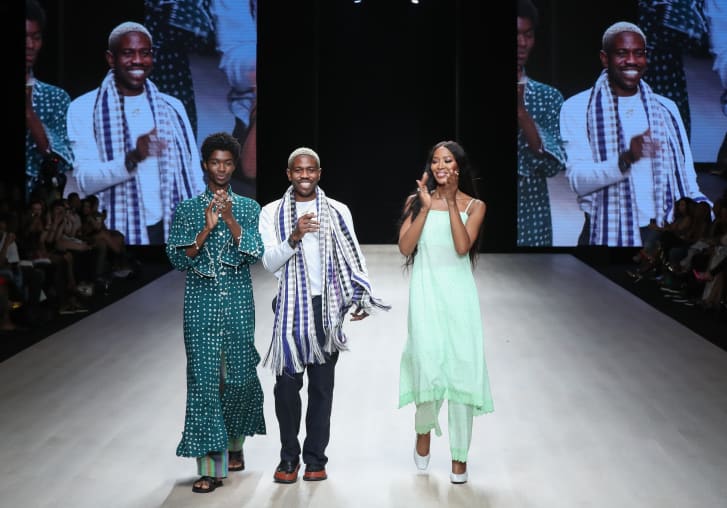Kenneth Ize’s name is on everyone’s lips. The Nigerian fashion designer and finalist for this year’s prestigious LVMH Prize, whose pieces have been worn by Naomi Campbell and Donald Glover, is giving a luxury finish to local artisanal aesthetics, rendering them desirable for high-end markets both at home and abroad.

As a result, Ize has never been busier. Speaking on the phone from Lagos, he often had to pause our conversation so he could speak with those around him about ongoing projects — the photoshoot he was overseeing, the production of his most recent menswear collection, which he presented in Paris at the end of June.
Laughing, Ize said his recent busyness had turned extreme multi-tasking into a way of life, which, as an emerging designer, he enthusiastically embraces.

“As a younger brand and as a millennial, I am in the space to do more things … and not have anybody (telling me) how to do it,” he said. “The actual beauty people can see in the work is (because) we have freedom to create what we want to create. And the whole point for me is about being really real.”
Authenticity and conviction come through in his work, which has seen him modernize the ancient craft of aso oke handweaving, a technique developed by the Yoruba people of south-western Nigeria.
Within Yoruba communities, Ize explained, the work of master weavers is highly regarded, and families often pass down fine fabrics as heirlooms or use them to create traditional Nigerian formalwear.
However, Ize’s aso oke fabrics, woven by his team in the western Nigerian town of Illorin, are fashioned into clean, contemporary silhouettes, expanding their appeal while celebrating the culture behind them.
“The goal now is to actually bring weaving into the Nigerian school curriculum,” he said. “But we also want to train adults, so we are building a site in Ilorin, as I want people to be able to come to my home country and learn something.”
As a graduate from Vienna’s Institute of Design, Ize knows first-hand the benefits of educational and cultural exchange, especially as fashion continues to grapple with questions about diversity: “At the same time we are teaching people … we are shifting the narrative,” he said.
To Ize, shifting the narrative also means using his line to tell “the stories that we as Nigerians have to tell.”
“For this season’s menswear, it’s a story about what happens after Christmas, a time when our parents — I mean the privileged ones — gave us pocket money, so there are new coats in the wardrobe,” he said.
The addition of his personal history, tastes and fantasies add honesty and piquancy to Ize’s work. But his clothes also resonate with customers because, as Ize explained, he’s making “pieces for today.”
For many of his customers, Ize’s clothes might be their first engagement with high-fashion made in Africa, which, as a continent, has long been excluded from conversations about luxury.
“I believe I am a professional in this industry and I force myself to do more each season,” he said. “I am telling the international audience it’s possible here.”
Source: CNN
